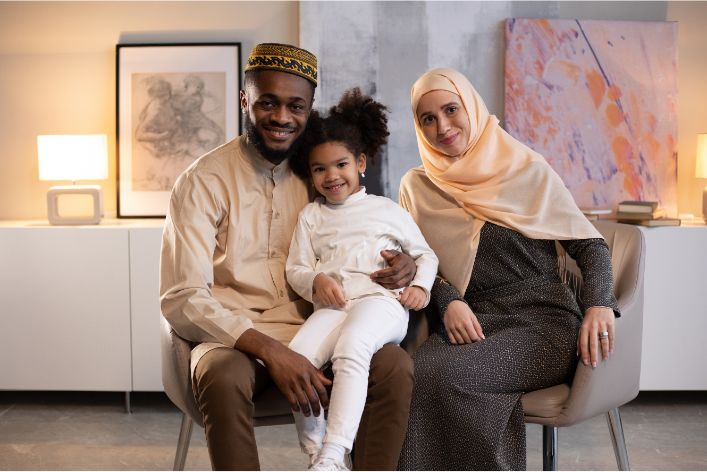Introduction
Nigerian parenting styles vary according to one’s tribe or ethnic group.
However, some common patterns exist such as a focus on respect for elders, strong work ethic, and gender roles. In Nigerian culture, the family is highly valued and is considered the cornerstone of society.
Thus, family values are central to Nigerian parenting styles. This blog post aims to examine the role of these values in Nigerian parenting styles.
Through discussing the importance of family values in Nigerian culture, we hope to demonstrate how they are integrated into parenting practices.
By the end of this blog post, you will have a better understanding of the significance of family values in Nigerian parenting styles and how they influence the worldview of Nigerian parents.
Read: Building Resilience in Nigerian Children: A Step-by-step Guide
Overview of Nigerian Parenting Styles
Nigeria is known for its rich cultural heritage, and family values play a critical role in Nigeria’s parenting styles.
Nigerian parenting styles are a blend of traditional and modern approaches that help shape the child’s behavior, character, and overall well-being.
In this blog post, we will discuss the four main parenting styles in Nigeria, which are authoritative, permissive, authoritarian, and neglectful parenting.
Authoritative Parenting
Authoritative parenting is a parenting style that is balanced and supportive, where the parents are involved in their children’s lives. They are nurturing, and the children have a sense of autonomy.
Parents in authoritative parenting style encourage their children to be independent and forward-thinking.
They set reasonable boundaries and rules and offer their children the freedom to make decisions within those boundaries. Children from authoritative parenting style are confident, self-reliant, and successful in life.
Permissive Parenting
Permissive parenting is a parenting style that is lenient, and the parents have minimal control over their children’s lives. In this parenting style, the children have little guidance over their actions, and the parents are more like friends than authority figures.
Children from permissive parenting style grow up with little understanding of boundaries and limitations that can affect their future behaviors and development.
Authoritarian Parenting
Authoritarian parenting is a rigid, disciplinarian approach to parenting where the children’s lives are highly structured, and the parents set strict rules without considering their children’s feelings and needs.
Parenting Made Just for You
Get personalized Parenting Solutions tailored to your child’s needs. Transform your parenting journey with expert guidance in 1-3 days.
Get StartedPunishments for transgressions are severe and often physically abusive and fear-based.
Children from authoritarian parenting style are often anxious, depressed, and rebellious, and it can lead to long-term mental health problems when they grow up.
Neglectful Parenting
Neglectful parenting is a parenting style where the parents show little interest in their children’s lives and their well-being.
Parents who practice neglectful parenting tend to be emotionally absent, and their children grow up feeling unloved, unwanted, and unsupported.
Children from neglectful parenting style have a higher risk of developmental delays, anxiety, depression, and drug abuse.
In fact, each of the four parenting styles has effects on the child’s behavior and well-being.
The authoritative parenting style is balanced and supportive, while permissive parenting style is lenient.
The authoritarian parenting style is rigid and disciplinarian, while neglectful parenting style is emotionally absent.
Understanding Nigerian parenting styles is critical for parents to adopt healthy parenting techniques that benefit their children in the long run.
Read: Fostering Healthy Social Relationships: Nigerian Kids’ Guide
Importance of Family Values in Nigerian Parenting
Parenting is a remarkable responsibility and crucial role for every parent. Nigerian parenting, like any other parenting styles, is inculcated with family values imparted by older generations to their children.
Relationship between Family values and parenting styles
Family values shape the parenting style of Nigerian parents.
For instance, Nigerian families often emphasize the values of respect for elders and hard work, reflected in parenting styles that enforce strict rules and physical discipline.
Conversely, Nigerian families that place a premium on creativity and independent thinking may be less rigid in their parenting approach and encourage free expression.
Unveil the Perfect Name that Tells Your Family's Story
Let us help you find a name that embodies your family's values, traditions, and dreams. Our personalized consultation weaves cultural insights to create a name that's uniquely yours.
Get StartedTypes of family values in Nigerian Culture
In Nigeria’s cultural context, family values can vary significantly, depending on factors like religion, socio-economic status, location, and education.
However, some of the most common family values in Nigeria include honesty, loyalty, respect, hard work, and education. These values are instilled in children from a tender age and guide their behavior and attitudes throughout life.
Role of Family Values in shaping children’s Behavior and Attitudes
Family values play a central role in shaping children’s behavior and attitudes. Nigerian parents who teach their children the value of honesty, for example, are more likely to raise children who avoid lying and deception.
The value of loyalty can help build strong family relationships where mutual trust and support exist, and children’s attitudes towards other people and the society can be positively influenced.
Hard work, perseverance, and determination, when emphasized in Nigerian families, can lead to a culture of excellence, discipline, and dedication that characterizes the Nigerian people.
Overall, family values are integral to Nigerian parenting styles, and the role they play in shaping children’s behavior and attitudes cannot be overemphasized.
Nigerian parents should prioritize teaching positive values in their children, including honesty, loyalty, respect, hard work, and education, as these values are essential for success both in personal and professional life.
Read: Empowering Nigerian Girls: A Guide for Today’s Parents
Impact of Globalization on Nigerian Parenting Styles
Rapid globalization has profoundly impacted parenting styles across different cultures, including Nigeria and other developing countries.
In this section, we will explore the influence of Western values on Nigerian parenting, as well as the challenges faced by Nigerian parents in maintaining family values in a globalized world.
Influence of western values on Nigerian Parenting
- Western values and parenting styles have begun to seep into Nigerian society through various channels, including television programs, movies, and social media.
- Such exposure has resulted in a shift towards more individualistic and permissive parenting styles, which are at odds with traditional Nigerian values.
- For instance, Nigerian parents, who previously relied heavily on corporal punishment to discipline their children, are now adopting gentler methods such as time-outs and positive reinforcement.
- Nigerian parents are also becoming more open to discussing sensitive topics such as sex education with their children, which was previously taboo.

Challenges Faced by Nigerian Parents in Maintaining Family Values in a Globalized World
- Globalization has brought about a reduction in family time as Nigerian parents struggle to balance work and family commitments.
- The result is that Nigerian children are spending less time with their parents and more time-consuming Western media that promotes individualistic values.
- Nigerian parents encounter challenges in instilling traditional values like respect for elders, communal living, and spirituality, often perceived as outdated.
- The changing economic landscape has also impacted Nigerian parenting styles, with more parents opting for smaller families due to economic pressures.
- The trend towards smaller families has resulted in a focus on quality rather than quantity, with Nigerian parents investing more in their children’s education and personal development.
Ultimately, the impact of globalization on Nigerian parenting styles has been both positive and negative. New parenting styles have fostered a more open and tolerant society but also eroded traditional Nigerian values.
Therefore, Nigerian parents must strike a balance between adopting new parenting styles and preserving traditional values. They ensure their children grow up as responsible, well-adjusted members of Nigerian society.
As Nigerian parenting styles evolve with globalization, it’s crucial for Nigerian parents to recognize the potential impact of Western values. They should actively shape their children’s development, ensuring a connection to their cultural heritage while embracing global opportunities.
Read: Nurturing Entrepreneurial Skills in Kids: Nigeria’s Approach
Strategies for Promoting Family Values in Nigerian Parenting
Nigeria is a country that values family and community, and this is evident in their parenting styles. Nigerian parents prioritize their children’s well-being and development, instilling strong family values in their offspring.
This article discusses various strategies Nigerian parents can use to promote family values in their parenting.
Importance of Communication in Building Family Values
Communication is the foundation of any relationship, including the parent-child relationship. It is essential for parents to communicate with their children effectively to help build family values.
Nigerian parents can promote open communication by creating a safe and welcoming environment for their children to express themselves.
They can do this by actively engaging their children in conversations and listening to their thoughts and opinions.
Setting Family Rules and Expectations
Promoting family values relies on establishing rules and expectations, enabling children to comprehend their responsibilities.
Nigerian parents can set clear rules and expectations that align with the family values they want to instill in their children.
These rules can cover various areas, such as academics, household responsibilities, and social interactions.
Nigerian parents should involve their children in setting these rules and expectations, and be consistent in enforcing them.
Fostering a Sense of Togetherness and Unity in the Family
A sense of togetherness and unity is crucial for promoting family values. Nigerian parents can foster this by encouraging their children to spend time together, sharing meals, playing games, and participating in family activities.
They can also create traditions that reinforce the family’s values, such as volunteering, celebrating cultural holidays, or participating in religious ceremonies together.
A strong family bond helps children develop a sense of belonging and encourages them to uphold family values.
Encouraging Involvement in Cultural and Religious Activities
Nigerian culture is rich in tradition and religious beliefs. Nigerian parents can promote family values by encouraging their children’s involvement in cultural and religious activities.
These activities provide a platform for children to learn about their heritage, develop a sense of pride and identity, and build a moral compass.
Nigerian parents can involve their children in activities such as attending religious services, cultural festivals, and family gatherings.
In the end, Nigerian parents must promote family values to raise heritage-grounded children, equipped for success in the world.
By implementing discussed strategies, Nigerian parents create a supportive environment, fostering children’s development and strengthening the family bond.
In Nigerian parenting, promoting family values requires effective communication, establishing clear rules and expectations, fostering togetherness and unity, and engaging in cultural and religious activities.
Read: Supporting Academic Excellence: A Nigerian Parent’s Role
Conclusion
Family values play a significant role in Nigerian parenting styles. They shape the behavior and worldview of children as they grow up and aid in their socialization.
In summary, we have seen that:
- Family values are an integral part of Nigerian culture and society that reflect the beliefs, customs, and practices of families
- Parents are primary caregivers and play a vital role in instilling family values in their children from a young age
- The promotion of honesty, respect, kindness, responsibility, and hard work are crucial in Nigerian parenting styles
- Technology and globalization have challenged traditional Nigerian family values and made it necessary to adapt to these changes
To promote family values in Nigerian families, the following recommendations can be made:
- Encourage communication and interaction between family members to foster understanding and togetherness
- Teach children about their cultural heritage and values to instill a sense of identity and pride in their heritage
- Emphasize the importance of moral and ethical behavior and provide positive role models for children to follow
- Limit the use of technology and the internet to prevent negative influences and promote family time
In Nigerian parenting styles, promoting family values is vital for children’s proper development and preserving Nigerian culture and society.




